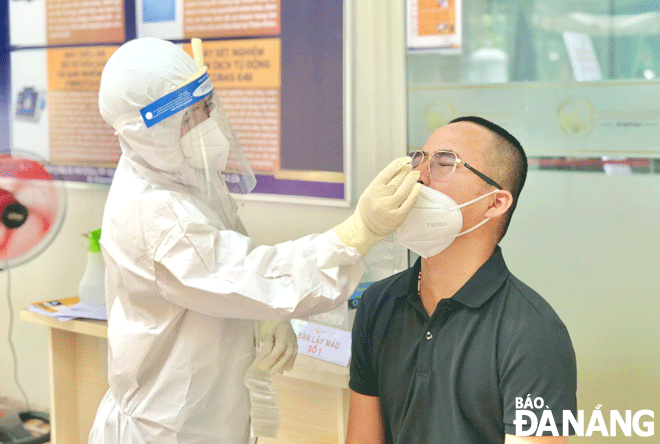Limiting wasteful use of COVID-19 rapid test kits
Currently, like those in other COVID-19-stricken localities, many people in Da Nang use COVID-19 rapid test kits to detect whether or not they contract the virus amid the complicated pandemic developments. However, according to recommendations made by the local healthcare industry, this method should not be abused as it may lead to waste and ineffectiveness in pandemic control.
 |
| The Da Nang healthcare sector recommends that people should not abuse rapid testing because it is wasteful and ineffective in the prevention and control of COVID-19. Photo: PHAN CHUNG |
Rapid COVID-19 tests prove effective
In Da Nang, the use of COVID-19 rapid test kits is currently the main method in pandemic prevention and control activities. According to Doctor Ngo Van Dinh Hoai, the Deputy Director of the Son Tra District Medical Centre, after receiving instructions from the Ministry of Health and the Department of Health, the center implemented this application of COVID-19 rapid test kits here and ward-level medical stations.
“Currently, out-patients to the district-level medical centre for regular medical checkups will get through free-of-charge tests for COVID-19 if they show suspected signs of COVID-19. Meanwhile, the test cost for those in need as per their request does not exceed VND78,000 /test”, said doctor Hoai.
The COVID-19 patient who is under treatment at home can actively perform a rapid test according to the instructions, then record a clip and send it to the medical stations for the confirmation of their infection status. After seven days of monitoring and treatment, the patient took a quick test again to confirm that he/she was cured of COVID-19.
“The fact that people take the initiative to test for the virus and announce the results to grassroots medical staff greatly reduces the workload of the grassroots healthcare stations, especially in the context of growing infection numbers”, said doctor Hoai.
Ton That Thanh, the Director of the city's Centre for Disease Control (CDC), thanks to the effective use of COVID-19 rapid test kits, the number of RT-PCR tests conducted by the CDC staff has significantly reduced, thus relieving a lot of work pressure.
If in the past, at peak times, there was a day when the Da Nang CDC tested up to 140,000 patient samples by RT-PCR method, now on average, it receives only 1,000-2,000 samples per day. This fact helps to save costs and reduce pressure on medical staff and is suitable for the actual situation, when the city’s daily caseload is still high.
Abuse of quick test causing waste, imbalance of supply – demand
According to doctor Thanh, there is a fact that people abuse and improperly use rapid test kits to monitor their own health.
“It is wasteful for people to abuse rapid testing to determine the risk of COVID-19 infection. Many cases that have just been accidentally exposed to COVID-19 patients in the morning, they take rapid tests in the afternoon. Actually, this is just a waste! In addition, the abuse of rapid testing created ‘a fever’ in the medical market for this item, accompanied by products with no quality nor clear origin”, said doctor Thanh.
According to doctor Vo Thu Tung, the Chief Inspector of the Da Nang Department of Health, according to the latest guidance released by the Ministry of Health, with COVID close contacts having received at least two doses of vaccine must perform a five-day at-home self isolation from the date of contracting the infected people and they only needs to take the test on the 5th day of the isolation period.
If they test negative for the virus, they shall continue to self-monitor their health for the next five days and seriously adhere to the 5K principle (khau trang - wearing face masks, khu khuan - disinfection, khoang cach - keeping distance, khai bao - making health declaration, khong tu tap - no gathering.
In case after seven days of at-home treatment and isolation, the test result is still positive, they must continue to isolate themselves for another three days to complete the 10-day isolation period as prescribed.
With regard to monitoring the current quality of rapid test kits, the Inspector of the Department of Health is setting up inspection teams to inspect the purchase and sale of this item and therapeutic and supportive drug products at pharmacies.
Currently, rapid test kits are on great demand, which drives abundant supply and distribution methods. The Da Nang Department of Health is planning an interdisciplinary inspection in collaboration with other relevant local agencies to conduct surprise checks in terms of the price and origin.
It is recommended that people do not use rapid testing in an excessive manner, when it is really necessary, they should choose to buy products of proven origin and guaranteed quality so as not to waste money.
Reporting by PHAN CHUNG – Translating by A.THU